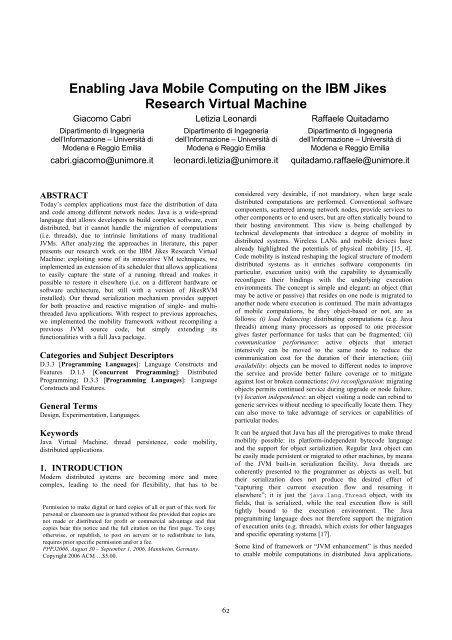4th International Conference on Principles and Practices ... - MADOC
4th International Conference on Principles and Practices ... - MADOC
4th International Conference on Principles and Practices ... - MADOC
Create successful ePaper yourself
Turn your PDF publications into a flip-book with our unique Google optimized e-Paper software.
Enabling Java Mobile Computing <strong>on</strong> the IBM Jikes<br />
Research Virtual Machine<br />
Giacomo Cabri<br />
Dipartimento di Ingegneria<br />
dell’Informazi<strong>on</strong>e – Università di<br />
Modena e Reggio Emilia<br />
cabri.giacomo@unimore.it<br />
Letizia Le<strong>on</strong>ardi<br />
Dipartimento di Ingegneria<br />
dell’Informazi<strong>on</strong>e – Università di<br />
Modena e Reggio Emilia<br />
le<strong>on</strong>ardi.letizia@unimore.it<br />
Raffaele Quitadamo<br />
Dipartimento di Ingegneria<br />
dell’Informazi<strong>on</strong>e – Università di<br />
Modena e Reggio Emilia<br />
quitadamo.raffaele@unimore.it<br />
ABSTRACT<br />
Today’s complex applicati<strong>on</strong>s must face the distributi<strong>on</strong> of data<br />
<strong>and</strong> code am<strong>on</strong>g different network nodes. Java is a wide-spread<br />
language that allows developers to build complex software, even<br />
distributed, but it cannot h<strong>and</strong>le the migrati<strong>on</strong> of computati<strong>on</strong>s<br />
(i.e. threads), due to intrinsic limitati<strong>on</strong>s of many traditi<strong>on</strong>al<br />
JVMs. After analyzing the approaches in literature, this paper<br />
presents our research work <strong>on</strong> the IBM Jikes Research Virtual<br />
Machine: exploiting some of its innovative VM techniques, we<br />
implemented an extensi<strong>on</strong> of its scheduler that allows applicati<strong>on</strong>s<br />
to easily capture the state of a running thread <strong>and</strong> makes it<br />
possible to restore it elsewhere (i.e. <strong>on</strong> a different hardware or<br />
software architecture, but still with a versi<strong>on</strong> of JikesRVM<br />
installed). Our thread serializati<strong>on</strong> mechanism provides support<br />
for both proactive <strong>and</strong> reactive migrati<strong>on</strong> of single- <strong>and</strong> multithreaded<br />
Java applicati<strong>on</strong>s. With respect to previous approaches,<br />
we implemented the mobility framework without recompiling a<br />
previous JVM source code, but simply extending its<br />
functi<strong>on</strong>alities with a full Java package.<br />
Categories <strong>and</strong> Subject Descriptors<br />
D.3.3 [Programming Languages]: Language C<strong>on</strong>structs <strong>and</strong><br />
Features D.1.3 [C<strong>on</strong>current Programming]: Distributed<br />
Programming; D.3.3 [Programming Languages]: Language<br />
C<strong>on</strong>structs <strong>and</strong> Features.<br />
General Terms<br />
Design, Experimentati<strong>on</strong>, Languages.<br />
Keywords<br />
Java Virtual Machine, thread persistence, code mobility,<br />
distributed applicati<strong>on</strong>s.<br />
1. INTRODUCTION<br />
Modern distributed systems are becoming more <strong>and</strong> more<br />
complex, leading to the need for flexibility, that has to be<br />
Permissi<strong>on</strong> to make digital or hard copies of all or part of this work for<br />
pers<strong>on</strong>al or classroom use is granted without fee provided that copies are<br />
not made or distributed for profit or commercial advantage <strong>and</strong> that<br />
copies bear this notice <strong>and</strong> the full citati<strong>on</strong> <strong>on</strong> the first page. To copy<br />
otherwise, or republish, to post <strong>on</strong> servers or to redistribute to lists,<br />
requires prior specific permissi<strong>on</strong> <strong>and</strong>/or a fee.<br />
PPPJ2006, August 30 – September 1, 2006, Mannheim, Germany.<br />
Copyright 2006 ACM …$5.00.<br />
c<strong>on</strong>sidered very desirable, if not m<strong>and</strong>atory, when large scale<br />
distributed computati<strong>on</strong>s are performed. C<strong>on</strong>venti<strong>on</strong>al software<br />
comp<strong>on</strong>ents, scattered am<strong>on</strong>g network nodes, provide services to<br />
other comp<strong>on</strong>ents or to end users, but are often statically bound to<br />
their hosting envir<strong>on</strong>ment. This view is being challenged by<br />
technical developments that introduce a degree of mobility in<br />
distributed systems. Wireless LANs <strong>and</strong> mobile devices have<br />
already highlighted the potentials of physical mobility [15, 4].<br />
Code mobility is instead reshaping the logical structure of modern<br />
distributed systems as it enriches software comp<strong>on</strong>ents (in<br />
particular, executi<strong>on</strong> units) with the capability to dynamically<br />
rec<strong>on</strong>figure their bindings with the underlying executi<strong>on</strong><br />
envir<strong>on</strong>ments. The c<strong>on</strong>cept is simple <strong>and</strong> elegant; an object (that<br />
may be active or passive) that resides <strong>on</strong> <strong>on</strong>e node is migrated to<br />
another node where executi<strong>on</strong> is c<strong>on</strong>tinued. The main advantages<br />
of mobile computati<strong>on</strong>s, be they object-based or not, are as<br />
follows: (i) load balancing: distributing computati<strong>on</strong>s (e.g. Java<br />
threads) am<strong>on</strong>g many processors as opposed to <strong>on</strong>e processor<br />
gives faster performance for tasks that can be fragmented; (ii)<br />
communicati<strong>on</strong> performance: active objects that interact<br />
intensively can be moved to the same node to reduce the<br />
communicati<strong>on</strong> cost for the durati<strong>on</strong> of their interacti<strong>on</strong>; (iii)<br />
availability: objects can be moved to different nodes to improve<br />
the service <strong>and</strong> provide better failure coverage or to mitigate<br />
against lost or broken c<strong>on</strong>necti<strong>on</strong>s; (iv) rec<strong>on</strong>figurati<strong>on</strong>: migrating<br />
objects permits c<strong>on</strong>tinued service during upgrade or node failure.<br />
(v) locati<strong>on</strong> independence: an object visiting a node can rebind to<br />
generic services without needing to specifically locate them. They<br />
can also move to take advantage of services or capabilities of<br />
particular nodes.<br />
It can be argued that Java has all the prerogatives to make thread<br />
mobility possible: its platform-independent bytecode language<br />
<strong>and</strong> the support for object serializati<strong>on</strong>. Regular Java object can<br />
be easily made persistent or migrated to other machines, by means<br />
of the JVM built-in serializati<strong>on</strong> facility. Java threads are<br />
coherently presented to the programmer as objects as well, but<br />
their serializati<strong>on</strong> does not produce the desired effect of<br />
“capturing their current executi<strong>on</strong> flow <strong>and</strong> resuming it<br />
elsewhere”; it is just the java.lang.Thread object, with its<br />
fields, that is serialized, while the real executi<strong>on</strong> flow is still<br />
tightly bound to the executi<strong>on</strong> envir<strong>on</strong>ment. The Java<br />
programming language does not therefore support the migrati<strong>on</strong><br />
of executi<strong>on</strong> units (e.g. threads), which exists for other languages<br />
<strong>and</strong> specific operating systems [17].<br />
Some kind of framework or “JVM enhancement” is thus needed<br />
to enable mobile computati<strong>on</strong>s in distributed Java applicati<strong>on</strong>s.<br />
62





